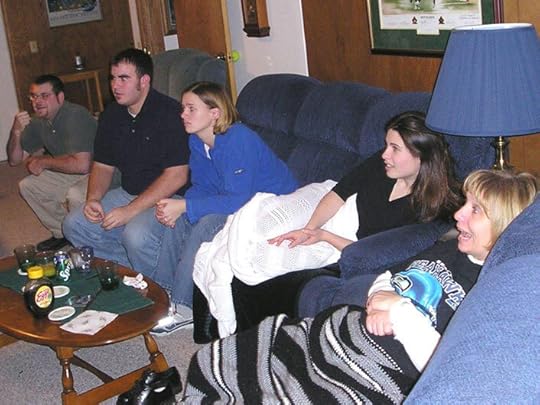Randy Alcorn's Blog, page 49
September 23, 2022
How Can Reading God’s Word Promote Lasting Happiness?

“How sweet Your word is to my taste—sweeter than honey in my mouth.” (Psalm 119:103, HCSB)
“The Bible is not an end in itself, but a means to bring men to an intimate and satisfying knowledge of God, that they may enter into Him, that they may delight in His Presence, may taste and know the inner sweetness of the very God Himself in the core and center of their hearts.” —A. W. Tozer
George Müller (1805–1898), an Englishman who spent his life caring for thousands of orphans in the 1800s, suffered from bad health and the weight of stressful responsibilities. One day he wrote in his journal, “This morning I greatly dishonored the Lord by irritability manifested toward my dear wife.” He said he fell “on my knees before God, praising him for having given me such a wife.”
Müller didn’t excuse his irritability. He knew his unhappiness and bad mood had displeased God and hurt his wife. He owned up to it. But he couldn’t eliminate stress or periodic bad health. So what was his solution? He wrote,
I saw more clearly than ever that the first great and primary business to which I ought to attend every day was, to have my soul happy in the Lord. The first thing to be concerned about was, not how much I might serve the Lord, but how I might get my soul into a happy state, and how my inner man might be nourished. . . . I saw that the most important thing I had to do was to give myself to the reading of the Word of God, and to meditation on it.
On another occasion Müller said, “In what way shall we attain to this settled happiness of soul? How shall we learn to enjoy God? . . . This happiness is to be obtained through the study of the holy Scriptures.”
Our happiness is proportionate to our investment in studying God’s Word. My conversion to Christ didn’t just make me a better person; it made me a happier person. As I’ve grown closer to Jesus, He has produced in me a deeper and greater happiness. Not because I’ve seen less evil and suffering—indeed, I’ve seen far more than I did when I was less happy.
My intellectual life and spiritual life aren’t on different tracks. They’re inseparable—Jesus said we’re to love the Lord our God with our hearts and our minds (see Matthew 22:37). Had I not taken time to go deep and ponder God and His truth and His ways, all the spiritual inclinations in the world wouldn’t have left me with a settled happiness. “As your words came to me I drank them in, and they filled my heart with joy and happiness because I belong to you, O Lord, the God who rules over all” (Jeremiah 15:16, NET).
There’s nothing wrong with things such as sports and politics and today’s news. But being an expert in those areas doesn’t prepare us to live wisely, make Christ-centered decisions, lead our families through hard times, or prepare us to die well. Time in God’s Word does.
People are unhappy because they listen to the thousands of unhappy voices clamoring for attention. Joy comes from listening to and believing words of joy from the source of joy. Jesus said, “My sheep hear my voice, and I know them, and they follow me” (John 10:27). When we follow Him, we’re happy. When we don’t, we’re not.
Many Christian men would agree that they’re experts in business, hunting, fishing, football, or cars. What if they took even half their time devoted to political talk shows and hobbies and invested it in learning solid Bible doctrine through listening to the Bible and reading great Christian books? As many others do, they could converse theologically with as much knowledge and pleasure as they can about sports, hunting, fishing, cars, or politics.
We all talk about what we know best—what’s most important to us. That means we need to change what’s important to us by investing more time in it.
How many men have frequent God-centered conversations today—with each other, their wives, and their children? How much pleasure and happiness are we depriving ourselves of by talking about everything except what matters most?
Calvin Miller (1936–2012) lamented, “Never have there been so many disciples who did so little studying. . . . Our day is plagued by hordes of miserable Christians whose pitiful study habits give them few victories and much frustration. Serious students will develop dynamic minds and a confident use of the gifts God has given to them.”
Scripture is joy-giving and liberating, not hostile and condemning. On the one hand, the law points out our unrighteousness, leading to our condemnation (see Romans 7:7). On the other hand, the life-giving aspect of the law caused David to happily celebrate it:
I delight in your commands because I love them (Psalm 119:47, NIV).
I deeply love your Law! I think about it all day (Psalm 119:97, CEV).
Charles Spurgeon said, “There is nothing in the Law of God that will rob you of happiness—it only denies you that which would cost you sorrow!”
Only by learning what Scripture says about God can we know what’s true about Him—and experience the truth-based happiness that flows from Him.
Holy and awesome God, you alone are worthy of our time and attention. Thank you for the life-giving, happiness-saturated gift of your Word! Help us realize what a treasure it is. May we not settle for anything less than daily seeking you through your Word and enjoying the happiness you’ve provided for us.
Browse more resourceson the topic of happiness, and see Randy’s related books, including Happiness and Does God Want Us to Be Happy?
Photo by Meredith Spencer on Unsplash
September 21, 2022
A Grace-Starved, Truth-Starved World Needs Jesus

Late one rainy night years ago, my wife and I were leaving a movie theater when Nanci noticed an older man in the parking lot leaning on a walker, struggling. I helped him get into his car. Since he was so exhausted, I asked if I could drive him home.
He declined, but I said we’d follow him home in case he needed help. As he pulled out, driving erratically, we prayed he wouldn’t find the street. Our prayers were answered when he got trapped in a fast-food drive-through line. I opened his door and asked him to move to the passenger seat so I could drive him home, while Nanci followed.
As I pulled out, two men jumped in front of the car, waving their arms and a cell phone. One shouted, “My wife’s having our baby, and I have to get home. Can you drive us?”
“Well,” I said, “this isn’t my car, and I don’t know this man sitting next to me.”
Sounded pretty lame, don’t you think?
I asked Nanci to drive the older man’s car and follow me while I took those guys home (wherever that was). After dropping them off, I hopped back in with George—by now I knew his name—to take him home (wherever that was). When we reached his place, I helped him to his room.
I found out George had been a political science professor at San Francisco State University for twenty-eight years. I realized that most people of George’s background would not count Bible-believing Christians among their favorite people! George asked me why we had helped him. I told him we were followers of Christ. I left him my book In Light of Eternity. I prayed God would touch his life and hoped we’d hear the rest of the story in eternity.
As it turns out, we didn’t have to wait that long.
Two months later my assistant Kathy woke up in the middle of the night experiencing a strange medical problem she’d never had before and hasn’t had since. The next day she went to her doctor, bringing with her a copy of In Light of Eternity. When the doctor saw it, he said, “One of my patients was carrying that book the other day—and he told me he wished he could talk to the author.”
Kathy returned to our office with George’s phone number. I called him and asked if he wanted me to drop by. He did. George was full of questions. He wanted to know the truth about Jesus Christ. He couldn’t get over the idea of grace, that God could really forgive rotten people. He said it sounded “too easy.”
Two hours of discussion followed. I saw God’s Spirit at work in George. Finally he prayed, confessed his sin, and accepted Christ’s gift of eternal life.
Now, what are the chances of all these events coinciding?
No chance at all—they were a series of divine appointments.
A small act of grace by my wife and me (two small acts, counting the trip to the woman ready to deliver a baby) somehow made an impression on George—and also got into his hands a book that offered him the truth.
What George saw, what he wrestled with, and what ultimately brought him to Christ was grace and truth.
What Gives Us Away?
A friend sat down in a small London restaurant and picked up a menu.
“What will it be?” the waiter asked.
Studying the puzzling selections, my friend said, “Uhh...”
The waiter smiled. “Oh, a Yank. What part of the States are you from?”
He hadn’t said a word. But he’d already given himself away.
In the first century, Christ’s followers were also recognized immediately. What gave them away?
It wasn’t their buildings. They had none.
It wasn’t their programs. They had none.
It wasn’t their political power. They had none.
It wasn’t their slick publications, TV networks, bumper stickers, or celebrities. They had none.
What was it?
“With great power the apostles continued to testify to the resurrection of the Lord Jesus, and much grace was upon them all.” (Acts 4:33)
They testified to the truth about Christ and lived by His grace. Truth was the food they ate and the message they spoke. Grace was the air they breathed and the life they lived.
The world around them had never seen anything like it. It still hasn’t.
The Two Essentials
The only “church growth formula” the early church possessed was the body of truth flowing with the blood of grace. They drew thousands to Jesus by being like Jesus.
But what does it mean to “be like Jesus”? We could come up with long lists of His character qualities. But the longer the list, the less we can wrap our minds around it. (I can’t even juggle three balls. How could I juggle dozens?)
But what if the character of Christ was reducible to two ingredients?
In fact, it is:
“In the beginning was the Word, and the Word was with God, and the Word was God.... The Word became flesh and made his dwelling among us. We have seen his glory, the glory of the One and Only, who came from the Father, full of grace and truth.” (John 1:1, 14, emphasis added)
Jesus is full of two things: grace and truth.
Not “full of patience, wisdom, beauty, compassion, and creativity.” In the list there are no commas and only one conjunction—grace and truth. Scripture distills Christ’s attributes into a two-point checklist of Christlikeness.
The baby born in a Bethlehem barn was Creator of the universe. He pitched His tent on the humble camping ground of our little planet. God’s glory no longer dwelt in a temple of wood and stone, but in Christ. He was the Holy of Holies.
But when He ascended back into the wide blue heavens, He left God’s shekinah glory—that visible manifestation of God’s presence—on earth. We Christians became His living temples, the new Holy of Holies (1 Corinthians 3:16–17; 6:19).
People had only to look at Jesus to see what God is like. People today should only have to look at us to see what Jesus is like. For better or worse, they’ll draw conclusions about Christ from what they see in us. If we fail the grace test, we fail to be Christlike. If we fail the truth test, we fail to be Christlike. If we pass both tests, we’re like Jesus.
A grace-starved, truth-starved world needs Jesus, full of grace and truth.
Excerpted from Randy's book The Grace and Truth Paradox .
Photo by Hossein Soltanloo on Unsplash
September 19, 2022
God’s Unseen Intervention

“Can a mother forget the baby at her breast and have no compassion on the child she has borne? Though she may forget, I will not forget you! See, I have engraved you on the palms of my hands; your walls are ever before me.” — Isaiah 49:15–16
Though I can’t prove it, I’m convinced God prevents far more evil than He allows. When His people are discouraged, God says that He can no more forget us and fail to have compassion than a mother could fail her own child. In fact, though some mothers have failed their children, God will never fail us. “See, I have engraved you on the palms of my hands.” What a powerful statement—by His own doing, we are permanently fixed on the very hands of God! And knowing us and loving us as He does, He often intervenes in ways we don’t always recognize.
On January 15, 2009, what should have brought certain death to passengers aboard US Airways Flight 1549, and catastrophe to Manhattan, turned into what secular reporters labeled a “miracle.” The pilot, Chesley Sullenberger, safely landed a crippled plane in New York’s Hudson River, with no serious injuries.
While chunks of ice and busy ferries filled most of the river, the place where the plane came down remained clear of both ice and boats. It landed without breaking apart. Ferryboat captains rescued all 155 people from the frigid river within minutes.
Though the miracle of Flight 1549 appears to be the exception, not the rule, isn’t it likely that a kind, all-powerful, and very compassionate God routinely prevents terrible tragedies in ways that we do not see and therefore do not credit as miracles? Perhaps one day we’ll hear those stories and marvel at how often God intervened when we imagined Him uninvolved in our world.
Focusing on God’s big miracles—like curing cancer and making brain tumors disappear—causes us to overlook His “small” daily miracles of providence in which He holds the universe together, provides us with air to breathe and lungs to breathe it, food to eat and stomachs to digest it. Our birthright does not include pain-free living. Only those who understand that this world languishes under the Curse will marvel at the beauties He provides us despite that Curse.
While the nature of faith is to trust God for what we do not see, we may base our trust in Him on many things we have seen—His Word, His creation, and how He has shown Himself in others, in our lives, and throughout history. We are called to trust God even when right now we can’t see His purposes. God is good even when we can’t see it.
God already has proven His eternal love for us in Christ Jesus. May He give us eyes to see how He demonstrates that love every day in hundreds of ways, most of which we take for granted. Faith means believing that God is good and that even if we can’t see it today, one day we will look back and see clearly His goodness and kindness.
Lord, there’s so much to be grateful for. Thanks for watching over us. We have no basis for believing that we as fallen creatures deserve a better world, and every basis to believe we deserve a worse one. Yet in your grace, you have guaranteed in Christ that we will live in such a world forever. Our thanks don’t seem adequate, but thank you nonetheless.
Excerpted from Randy's book 90 Days of God's Goodness.
Photo by Jakob Owens on Unsplash
September 16, 2022
The Opening Weekend of NFL Football, and Christ’s Companionship in Unanticipated Grief

This week Nanci’s sister Donna initiated a conversation between my daughters Karina and Angela and me about the first weekend of NFL football. She rightly discerned how big last weekend would’ve been in Nanci’s life and how challenging it would be for our family.
 It was a tough weekend, tougher than I anticipated. The first game of the season was Thursday night. I was at our friends’ house where we always had Thursday night dinner and watched football together. People were talking and not paying close attention to the game (and that’s perfectly fine), but I thought if Nanci were there, she would’ve whistled loudly and said, “I want to watch this game!” Everyone would’ve laughed. Monday night I was watching with Angela and her husband Dan at their place (our grandsons had work or sports). It was a fun game, but without Nanci football season isn’t what it was. (It was WAY too quiet!)
It was a tough weekend, tougher than I anticipated. The first game of the season was Thursday night. I was at our friends’ house where we always had Thursday night dinner and watched football together. People were talking and not paying close attention to the game (and that’s perfectly fine), but I thought if Nanci were there, she would’ve whistled loudly and said, “I want to watch this game!” Everyone would’ve laughed. Monday night I was watching with Angela and her husband Dan at their place (our grandsons had work or sports). It was a fun game, but without Nanci football season isn’t what it was. (It was WAY too quiet!)
I did a podcast this week with a man whose wife died three months before Nanci, and who has been studying the Heaven book. He broke down several times, and I was deeply moved also, and shared how difficult the opening NFL weekend was for me. He wanted to know what his wife was experiencing in Heaven now in contrast to what she would experience on the New Earth, and while I certainly don’t know all the answers, I do know that in the resurrection, things like sports will surely exist because the resurrection will be a redemption and return to all the goodness of the previous life under the Curse, without any of the bad. Of course, that would include not only music and art and work and hobbies but also sports and all other aspects of culture—cleansed, redeemed, and devoid of sin.
 I wouldn’t be at all surprised if Nanci was able to see the guys she knows and loves (along with their wives) from NFL conferences we have attended the past six years. She always cheered for and prayed for them as they played. It’s all up to God, but there are several passages that suggest people in the present Heaven can see things on earth. We might think surely those would only be the things that profoundly matter. Well, since we don’t cease to be human when we die, it might also include things we have a fondness for. I don’t assume that Nanci can no longer see our dog Gracie and some of her other favorite dogs (she had a lot of them). Maybe she doesn’t, but I wouldn’t be the least bit surprised if she does. When we go to be with Jesus do we lose our interests in our loved ones still on earth? Do we cease to care about our churches and the things that were fun for us, and our hobbies, sports, animals, and the wonders of the earth? I don’t believe Heaven is a place where we lose the old joys as much as see them redeemed and magnified.
I wouldn’t be at all surprised if Nanci was able to see the guys she knows and loves (along with their wives) from NFL conferences we have attended the past six years. She always cheered for and prayed for them as they played. It’s all up to God, but there are several passages that suggest people in the present Heaven can see things on earth. We might think surely those would only be the things that profoundly matter. Well, since we don’t cease to be human when we die, it might also include things we have a fondness for. I don’t assume that Nanci can no longer see our dog Gracie and some of her other favorite dogs (she had a lot of them). Maybe she doesn’t, but I wouldn’t be the least bit surprised if she does. When we go to be with Jesus do we lose our interests in our loved ones still on earth? Do we cease to care about our churches and the things that were fun for us, and our hobbies, sports, animals, and the wonders of the earth? I don’t believe Heaven is a place where we lose the old joys as much as see them redeemed and magnified.
In retrospect, I don’t know why I didn’t expect last weekend to be so difficult. Had it been Nanci’s birthday or Thanksgiving or Christmas, it would’ve made sense, and I would’ve known it was coming. And yet it makes perfect sense because she so loved pro football, and it was something we enjoyed together every weekend in the fall. This is where grief is unpredictable—it sneaks up on you and slaps you in the face. I’m reminded of what C.S. Lewis wrote in his book A Grief Observed: “I thought I could describe a state; make a map of sorrow. Sorrow, however, turns out to be not a state but a process. It needs not a map but a history.”
 As I’ve told others over the years, there’s no right or wrong time frame for experiencing grief, and no neat and tidy “going through the five stages of grief.” And yet there was still such a warm feeling in my heart as I imagined Nanci with Jesus and wondered whether He let her watch some of her favorite players pull off some huge and unexpected wins. ️Or in other cases, be made more like Jesus as they experienced the disappointments of losses.
As I’ve told others over the years, there’s no right or wrong time frame for experiencing grief, and no neat and tidy “going through the five stages of grief.” And yet there was still such a warm feeling in my heart as I imagined Nanci with Jesus and wondered whether He let her watch some of her favorite players pull off some huge and unexpected wins. ️Or in other cases, be made more like Jesus as they experienced the disappointments of losses.
Our grief at the death of those we love is real and deep, yet knowing Christ transforms it. The Bible everywhere assumes that people will grieve. Job grieved unbearably at the loss of his ten children (Job 1:20; 2:13); so did the widow of Nain, who lost her son and received Jesus’ compassion (see Luke 7:11–13).
Men stoned Stephen to death. Before dying, he beheld Jesus at the Father’s right hand. Remarkably, Luke tells us, “Godly men buried Stephen and mourned deeply for him” (Acts 8:2). They mourned a brother who had died righteously and who in dying had seen his beloved Jesus! Don’t miss this remarkable point—knowing that Stephen was far better off being with the Lord didn’t keep his friends from deeply mourning their loss.
Clarissa Moll writes in Beyond the Darkness: A Gentle Guide for Living with Grief & Thriving after Loss:
The sorrow you feel after losing a loved one is so powerful and so life-shaping it can be personified. Grief is your companion.
…You may never have thought or heard of grief as a companion before, but I’m convinced we need this new paradigm of companionship for two reasons. First, we need words to describe how grief really operates in our lives. The longer we live with it, the more we discover that grief is persistent, all encompassing, and long lasting. It isn’t static but grows and changes over time. Envisioning grief as a companion allows us to release the striving and resistance that characterizes so much of contemporary bereavement. We can turn to our grief with compassion, listen to her sorrows, and learn from her wisdom. If you’re looking for progress, this is what it actually looks like.
Second, as we acknowledge, accept, and yes, even embrace grief, this unwelcome companion can offer us hope for the future. …Befriending our grief can be the key to finding flourishing again. Isaiah 53 tells us that Jesus would be “acquainted” with grief, a word that in Hebrew can be translated “familiar friend.” While we are busy trying outrun or heal or recover from our sorrows, Jesus invites us to a better way—not to avoid sadness but to befriend it. By gently companioning our grief, we can follow in Jesus’ footsteps.
…The idea of grief as a companion invites you to release expectations and platitudes that reflect a narrow gospel—a 2D flannelgraph version of death and resurrection that doesn’t take into account the complexities of living in a world that remains under the curse of sin. And with an experienced friend like Jesus beside you, can you step into a fuller story, one in which you can learn to trust God in new, intimate ways in the midst of your darkness, as you wait with hope for what is “not yet.”
God gave us grief as a way to express what is lost. For the bereaved believer, then, the task is not to dismiss this emotion… Instead, we can turn to grief, assured that God can offer grace through it. Knowing that God gave us the capacity for deep sorrow, we can use even this difficult gift as an opportunity to know him more.
As Clarissa explains, grief is a companion; but our greater companion and closest friend is Jesus. In Psalm 16:8 David says, “I have set the LORD always before me. Because he is at my right hand, I will not be shaken.” To set the Lord before me is to recognize His presence and His constant help.
I’ve told many who ask how I’m doing that I’m enjoying the presence of Jesus, who said to His disciples, “Now you are my friends, since I have told you everything the Father told me” (John 15:15, NLT). And I’m still learning to navigate life here without Nanci. It’s hard on some days, easier on others. I’m so grateful not only for Jesus’s Lordship, but also His friendship in this season. He has said, “Never will I leave you; never will I forsake you” (Hebrews 13:5). His presence helps me put one foot in front of the other, not with sense of drudgery, but with a sense of gratitude and comfort, knowing God is with me and is giving me strength.
Nanci is in the care of Jesus in a world without sin and suffering; I am in the care of Jesus in a world still under the Curse and afflicted with sin and suffering. I’m profoundly thankful that she does not have to come back to this world, and that I too will ultimately leave this world for one “better by far.” After the resurrection and final judgment (Revelation 20:4-6; 11-14), the present Heaven, which includes the New Jerusalem, will be relocated to the New Earth, to which God will come down and dwell forever with His people (Revelation 21:1-3). Nanci and I and all who love Jesus will have the privilege and thrill of colonizing that redeemed earth together.
I’ll sign off this blog with the concluding words from Lewis’s The Last Battle, the final book of The Chronicles of Narnia, that have filled my heart since the first time I read them fifty years ago as a very young Christian:
And as He [King Aslan] spoke He no longer looked to them like a lion; but the things that began to happen after that were so great and beautiful that I cannot write them. And for us this is the end of all the stories, and we can most truly say that they all lived happily ever after. But for them it was only the beginning of the real story. All their life in this world and all their adventures in Narnia had only been the cover and the title page: now at least they were beginning Chapter One of the Great Story which no one on earth has read: which goes on for ever: in which every chapter is better than the one before.
September 14, 2022
We Grow Up in Christ by Growing Down in Lowliness

Recently I shared this great quote from J.I. Packer on my Facebook page:
“It is impossible at the same time to give the impression both that I am a great Christian and that Jesus Christ is a great Master. So the Christian will practice curling up small, as it were, so that in and through him or her the Savior may show himself great.” —J.I. Packer
A commenter took issue with Packer's point:
I have looked at this statement from every possible angle and cannot figure out where you are coming from with this statement. The Creator of the universe, Almighty God, Redeemer, Sustainer, our rock and our salvation has no need for any of His creation to try and look small in order for Him to look great. HE IS GREAT with or without us “helping” Him.
Personally, I agree with what Packer said. After all, Scripture says Christ must become greater, and we must become less. Does our becoming less make Him greater? Of course not. Can our becoming less show Him to be greater? Yes.
One of our staff members responded to the comment by sharing the context of Packer’s quote, which came from Rediscovering Holiness: Know the Fullness of Life with God. Hope you enjoy these profound thoughts from J.I. Packer, one of my favorite writers and people. (Here’s a tribute I wrote after he went to be with Jesus in 2020.)
Growing Up and Growing Downward
From time to time during our son’s teen years he would stand with his back to the dining room doorpost, and we would record his height in pencil on the white wood. He was growing up physically, getting taller as each month went by, and he was excited about it. So were we. Watching your children grow up is, after all, an exciting business. Had we not been interested in the way he was gaining height there would have been something wrong with us. But this chapter is not about growing up; it is about growing down; something that every Christian must learn to do.
Growing down, or downward, is doubtless an odd-sounding phrase in a culture like ours. We celebrate the fact of growing up physically and urge those who have slipped into childish petulance to grow up emotionally. It is also our habit to speak of growing up spiritually, and our English Bible does the same. The New International Version (NIV) follows the King James Version (KJV) and all revisions of it in rendering a Greek verb that has nothing of “up” about it as “grow up” in Ephesians 4:15 (“We will in all things grow up into him who is the Head, that is Christ”), and in 1 Peter 2:2 it does the same (“Like newborn babies, crave pure spiritual milk, so that by it you may grow up in your salvation”).
Yes, to speak of growing downward against this background does sound odd, I grant you. But my phrase is there to strike a spark and make a point. What we have to realize is that we grow up into Christ by growing down in lowliness (humility, from the Latin word humilis, meaning low). Christians, we might say, grow greater by getting smaller.
Of his own ministry, in relation to that of the Lord Jesus, John the Baptist declared: “He must become greater; I must become less” (John 3:30). Of our lives as believers, something similar has to be said. Pride blows us up like balloons, but grace punctures our conceit and lets the hot, proud air out of the system. The result (a very salutary result) is that we shrink, and end up seeing ourselves as less—less nice, less able, less wise, less good, less strong, less steady, less committed, less of a piece—than ever we thought we were. We stop kidding ourselves that we are persons of great importance to the world and to God. We settle for being insignificant and dispensable.
Off-loading our fantasies of omnicompetence, we start trying to be trustful, obedient, dependent, and willing in our relationship to God. We give up our dreams of being greatly admired for doing wonderfully well. We begin teaching ourselves unemotionally and matter-of-factly to recognize that we are not likely ever to appear, or actually to be, much of a success by the world’s standards. We bow to events that rub our noses in the reality of our own weaknesses, and we look to God for strength quietly to cope. This is part, at least, of what it means to answer our Lord’s call to childlikeness.
The Scottish scholar James Denny once said that it is impossible at the same time to leave the impression both that I am a great preacher and that Jesus Christ is a great Savior. In the same way it is impossible at the same time to give the impression both that I am a great Christian and Jesus Christ is a great Master. So the Christian will practice curling up small, as it were, so that in and through him or her the Savior may show Himself great. That is what I mean by growing downward.
Photo by Stephen Leonardi on Unsplash
September 12, 2022
Joni Eareckson Tada Shares Her New Resolve After 55 Years in a Wheelchair

Note from Randy: There are few people who I admire more than Joni Eareckson Tada. This recent article by her is so beautifully written, and just so Joni.
EPM loves the heart and mission of Joni and Friends, the ministry she founded, and they’re one of the main organizations we support with our Disability Special Fund. (100% of all contributions to our special funds go to carefully chosen ministries; give online here. You can also donate directly to JAF.)
Dear Joni writes, “What else could be more important than practicing Christianity, with sleeves rolled up, among the needy?” She’s so right, and over the last 55 years, she’s demonstrated this beautifully, to the glory of King Jesus.
I sometimes wonder, Who am I, God, that you have brought me this far? Lately, I’ve been whispering that question from 1 Chronicles 17:16: “Then King David [said], “Who am I, O LORD God, and what is my house, that you have brought me thus far?” Who am I to enjoy a platform on national radio for 40 years? Who am I that I should be so blessed in marriage to Ken for 40 years? And how did I ever have the strength to survive 55 years as a quadriplegic in a wheelchair?
The truth is, I don’t have the strength. I still wake up every morning needing God desperately. Like David, I often confess, “I am poor and needy” (Psalm 40:17). Perhaps that’s how God brought me this far. I cannot say, but I do know that “the eyes of the LORD range throughout the earth to strengthen those whose hearts are fully committed to him” (2 Chronicles 16:9, NIV). God is searching high and low for weak people who love him so that he can pour into them his strength. Maybe that’s my story, but how I arrived here is not for me to say. I just keep praising my sovereign God with every milestone I pass.
It’s the noble cause of Christ to which I’ve dedicated myself for decades, and I can’t think of anything that gives me more joy. Yet as I reach the milestone of 55 years of quadriplegia—not to mention two bouts of cancer, severe breathing issues, COVID-19, and chronic pain—I hold tightly to Acts 20:24 (NIV): “I consider my life worth nothing to me; my only aim is to finish the race and complete the task the Lord Jesus has given me—the task of testifying to the good news of God’s grace.”
And with this anniversary marking 55 years in my wheelchair, I’m reflecting on more than a few milestones through which God has done amazing things.
Anniversary of the Disabilities Act
When a broken neck upended my life 55 years ago, leaving me depressed and devastated, the last people I wanted to be around were wheelchair users like me. They made me feel awkward, so I basically ignored anyone with a disabling condition. Imagine my amazement when a little over a decade later, God used my own affliction to birth an international disability ministry. Somewhere within that decade, I rose above my fears of the future and my disdain for others with disabilities. God transformed my heart, changed my attitude, and showed me there are more important things in life than walking.
I landed in a wheelchair at a time when there was very little access for people using mobility equipment. Back in the 1970s I would arrive at a restaurant, only to be told to wheel down an alley, past smelly dumpsters, into a side door that led through a crowded, noisy kitchen in order to reach my dining table.
I remember getting stuck in a boutique dressing room while trying on clothes. My wheelchair had become wedged tightly between the swinging door and the wall; the store manager had to come and jerk me free. My wheelchair left scuff marks all over the dressing room. I was terribly embarrassed. That was the way things were in the early 70s, before the Americans with Disabilities Act (ADA).
With each passing year, I racked up more embarrassing incidents of being stranded, getting stuck, and navigating long, winding detours to get into movie theaters, restaurants, churches, and stores. I finally had my fill of embarrassing episodes, so I began to actively advocate for myself and for others with disabilities.
In the late 1980s, I somehow landed a position on the National Council on Disability under President Reagan. One of the first initiatives the Council tackled was the lack of access in public places. Working with other disability groups, we were able to send to Congress a landmark bill to improve access for Americans with disabilities. Finally, in 1990, I sat on the White House lawn with other Council members and watched President Bush sign into law the ADA.
I don’t often think about those days I served on the Council. During a recent vacation in Yosemite National Park, however, Ken and I noticed that everywhere we went, the paths were paved and marked with access symbols. I was pleasantly surprised to discover miles of trails I could wander. And for places I couldn’t wheel, there were accessible trams.
At one point while wheeling along the Yosemite Valley floor, I stopped to reflect tearfully on the days I would make my way through dark alleys and backdoors. That was then. And now? Virtually the whole national parks system is open to me. This month marks 32 years since the ADA was signed into law.
Beyond Advocacy: A Vision for Belonging
Of course, people living with disabilities need more than just smooth sidewalks, lowered drinking fountains, and exit ramps. Here in the U.S., laws enforcing accessibility standards are helpful, but they cannot deliver the sense of belonging that disabled people so often lack. Though 32 years have passed since the ADA, people with disabilities are often still isolated and marginalized. That’s why I started Joni and Friends in 1979. I knew there were countless thousands struggling with the same resentments and fears about their disabilities. So I pulled together a team of like-hearted friends who wanted to do everything we could to make Christ real to disabled people around the world.
A higher law than the ADA is needed. In Luke 14:13–14, Jesus tells us to “invite the poor, the crippled, the lame, the blind, and you will be blessed.” At Joni and Friends, we envision a world where every person with a disability finds hope, dignity, and their place in the body of Christ.
For example, here in the U.S., we hold Family Retreats where parents of those with special needs receive much-needed respite and whole families discover they belong—not just within a community that understands them but in the body of Christ. Thousands of veterans have returned from war struggling with physical wounds, moral injuries, and PTSD, so we hold Warrior Getaways for these brave service men and women and their families. There are also desperate needs in communities like East St. Louis, Nashville, and Downtown Los Angeles. So we’re seeking to grow our programs and resource churches to bring people with disabilities into the fold—into God’s house through faith in Christ.
Global Reach for a Global Need
My heart breaks when I think of the 1 billion disabled people around the world, most of whom live in poverty with little hope of change. They feel forgotten by their communities. But Jesus hasn’t forgotten them.
In developing nations around the world, we’re distributing wheelchairs and Bibles through our Wheels for the World outreach. Joni’s House consists of disability centers offering occupational therapy, medical supplies, Bible studies and discipleship programs, job-skills training, wheelchair maintenance, and more. We also partner with local hospitals to provide wound care, surgical support, and physical therapy. In short, we labor to “prove” the power of the salvation message with evidence of Christ-centered compassion.
We were about to break ground on a new Joni’s House in Ukraine when the war erupted in February. As Russian bombs dropped, disabled people became stranded in harm’s way. So we started serving Ukrainians with disabilities—just not in the way we’d planned. Our in-country coordinator, Galyna, began organizing evacuation efforts, even as Russia stepped up its rocket strikes. Supported by her network of churches and our partners in Poland, Galyna worked tirelessly and courageously to track down people with disabilities and evacuate the most vulnerable among them—hundreds to date.
Now, even as Ukraine gets fewer headlines, Galyna and members of our network continue to provide housing and food supplies for Ukrainians with disabilities. We’re currently planning a Family Retreat for relocated Ukrainians with disabilities and their caregivers.
Heaven-Bent
From the dark basements in Ukraine to the foothills of the Himalayas to the streets of Downtown Los Angeles, people with disabilities are suffering unspeakably. Their needs are urgent, and so I’m “wheeling” the race that the Lord Jesus has set before me. There are too many people struggling as I did 55 years ago when I crushed my spinal cord and became a quadriplegic.
Aging with quadriplegia may be filled with extra challenges, but it doesn’t demoralize me. With God’s help, I hold everything lightly. I try not to grasp at my fragile life, nor coddle it or minimize my activities at Joni and Friends just because I’m getting older, growing weaker, and dealing with more pain. Rather, I find great comfort and joy in dying to self and living every day to serve the Lord Jesus and others around the world whose disabilities are far more profound than mine.
What else could be more important than practicing Christianity, with sleeves rolled up, among the needy? When I do become tired, I’m inspired by the life of Jesus who, even as he was nailed on his cross and in great pain, nevertheless kept serving others (like the thief, his mother, and the soldiers who needed forgiveness). Ephesians 5:1 tells me to imitate him. So I’m heaven-bent on honoring my Jesus, serving others, finishing the race, and completing the task of testifying to gospel grace.
This article originally appeared on The Gospel Coalition, and is used with the author’s permission.
September 9, 2022
Sharing the Gospel, Living a Generous Life: My Interview with Scott Linebrink

I enjoyed talking with Scott Linebrink on his podcast, Get in the Game, about sharing the Gospel and being generous with our money and spiritual gifts. Scott was a Major League baseball pitcher for twelve years and now serves as Partnerships Director for Water Mission, a great ministry and one I encourage people to support.
Here’s a short clip from our conversation:
You can listen to the full interview here.
September 7, 2022
What about Lending Money, Charging Interest, and Cosigning a Loan?

There are many possible motives for lending money. One is to meet another person’s need; another is to profit from the loan by charging interest. Nothing is inherently wrong with lending. It's a mark of God's blessing to be in the position to make a loan (Deuteronomy 28:12). The righteous is one who gives and lends (Psalm 37:21, 26). God approves of the generous person who lends freely (Psalm 112:5).
In certain cases, lenders graciously forgave debt (Matthew 18:32-33). In Israel, every fifty years was the year of Jubilee, in which all debts were forgiven (Deuteronomy 15:1-3; Nehemiah 10:31).
Jesus stated that when we lend we're not to expect repayment (Luke 6:34-35). The borrower is morally obligated to make the payment (Psalm 37:21). But we, in the spirit of giving, are to lend as we might give, expecting nothing in return. If we would force repayment, we shouldn't loan in the first place.
Built into the disciples’ prayer is the well-known but seldom practiced phrase, “Forgive us our debts, as we also have forgiven our debtors” (Matthew 6:12).
The lender must evaluate the character of the borrower. To distribute money into the hands of a drug addict, compulsive gambler, or cultist is irresponsible. Furthermore, we should weigh whether a loan is what this person really needs. Given the many dangers of debt, are we really helping him by indebting him to us? Loaning money to bail out someone lacking financial discipline is like trying to put out a fire with gasoline.
Calculate the effects of the loan on relationships. While we may imagine lending money will endear people to us, experience often proves the opposite. One of the best definitions of a distant friend is “a close friend who owes you money.” If someone irritates you and you wish never to see him again, give him a loan!
Charging Interest
In the Old Testament, stipulations governed borrowing and lending. While collateral could be held, it was forbidden to hold an essential security, such as a garment needed for warmth on cold nights (Exodus 22:26-27; Deuteronomy 24:10-17).
Charging interest is the means by which a lender profits from a borrower. Charging interest was common practice in Babylon, Rome, and many ancient cultures. In Israel, interest could be charged to foreigners, but not as a means of exploitation (Deuteronomy 23:19-20). Loans to brothers, fellow Jews, were always to be interest free (Exodus 22:25; Leviticus 25:35-37; Deuteronomy 23:20).
Whether interest is charged or not, there should be a spirit of graciousness in lending (Deuteronomy 15:8, 10). No one should take advantage of a person's misfortune. We must loan primarily to help him, not to help ourselves. We're not even to take our brother to court to recoup our losses, since it's better to experience loss than to bring conflict with a brother before unbelievers (1 Corinthians 6:1-7).
Israel had a largely noninflationary economy. A lender's money was worth the same to him when it was returned as when he loaned it. Perhaps in an inflationary economy interest might be charged to match the inflation rate. But even if this isn't done, the gracious heart won't quibble about minor losses when his purpose in lending is to extend grace, not demand repayment.
Throughout church history, Christian teachers have taken a strong position against exacting usury on a loan in order to make personal profit. Whereas usury is thought of today as charging excess interest, the word actually meant charging any interest. Ambrose said, “If anyone commits usury, he commits robbery and no longer has life.” Calvin declared that the professional money lender should be banned from the church. Luther commented, “After the devil there is no greater human enemy on earth than a miser and usurer, for he desires to be above everyone.”
Still, Jesus spoke without condemnation of gaining interest by deposit to a moneylender (Luke 19:23). While this was a reference in a parable and doesn't necessarily imply approval, it seems unlikely he'd use as a positive illustration what he believed was wrong.
It appears charging interest isn’t wrong per se. It might be appropriate for lending institutions, but not for individuals if they’re loaning to fellow believers to help meet their needs. If interest is charged, perhaps it should no more than the current inflation rate.
There’s a time to lend, a time to give, and a time to do neither. If the need isn't legitimate, I shouldn't give or lend. If the need’s legitimate, not the result of an unwise choice in which there’s a lesson to be learned, I might give. If, on the other hand, the need is real but a gift would contribute to someone's irresponsibility or loss of dignity, lending may be best.
I must be careful not to encourage my brother’s indebtedness unless it's absolutely necessary. The last thing the person in debt needs is to incur still another debt. When the needs are legitimate, a Christian policy ought to be to give freely. When the situation merits it, I may make a loan, but only in the same helpful spirit as the gift.
Signing for Another Person’s Loans
Cosigning is assuming responsibility for the debts of another in order to assure a creditor that the borrower won't default on payment. If the person for whom I sign doesn't come through, I'm legally assuming his entire liability.
Scripture is very clear on this—we are told not to do it (Proverbs 11:15). “Do not be a man who strikes hands in pledge or puts up security for debts; if you lack the means to pay, your very bed will be snatched from under you” (Proverbs 22:26-27). In fact, we’re told if we have already put up security for our neighbor, we should go and humble ourselves and plead and allow ourselves no sleep until, like a gazelle, we are freed from the snare we have put ourselves in (Proverbs 6:1-5). To assume responsibility for the debt of another is to demonstrate poor judgment (Proverbs 17:18). If you doubt this teaching of Scripture, consider that no less than 50 percent of all cosigners end up paying back part or all of the other person's debt!
When I sign for someone else, I am saying, “I will answer for all of this person’s financial decisions, wise or unwise. I'm now legally and financially accountable for whatever he chooses to do.”
If your desire is to help someone, give him or loan him the money outright, or offer him sound advice. More often than not, he shouldn’t be going into debt in the first place. The best favor you can do when he asks you to sign for him is to just say no.
See more resources on money and giving, as well as Randy's related books, including Money, Possessions, and Eternity.
Photo by Monstera
September 5, 2022
Will We Use Our Creativity in Heaven?

Several years ago I spoke at the Canvas Conference, which was a great two-day conference on human creativity and beauty with biblical, gospel-centered theology. In this video clip, I answer a question about whether we will have creativity and use it in eternity:
Here are some related thoughts:
God gave people creativity in their unfallen state, which remained but was twisted when we fell. He will surely not give us less creativity in Heaven but more, unmarred by sin, unlimited by mortality. We will compose, write, paint, carve, build, plant, and grow.
The first person Scripture describes as “filled with the Spirit” wasn’t a prophet or priest; he was a craftsman, “with skill, ability and knowledge in all kinds of crafts—to make artistic designs . . . and to engage in all kinds of craftsmanship” (Exodus 31:1-3).
God gifted and called Bezalel to be a skilled laborer, a master craftsman, a God-glorifying artist. Bezalel and Oholiab were not only to create works of art but also to train apprentices to do so. The gifting and calling were from God: “He has filled them with skill to do all kinds of work as craftsmen, designers, embroiderers in blue, purple and scarlet yarn and fine linen, and weavers—all of them master craftsmen and designers” (Exodus 35:35).
If you don’t believe craftsmanship will be an important part of the New Earth, read Exodus 25–40. God tells His people in exquisite detail how to sew clothing, what colors to use, how to construct the furniture for the Ark of the Covenant and Tabernacle, what stones to put on the high priest’s breastplate, and so on.
The Master Designer goes into great detail in His instructions for building the Tabernacle: the veil and curtain, the Ark of the Covenant, the table, the lampstand, the altar of burnt offerings, the courtyard, the incense altar, the washbasin, the priests’ clothing. The design, precision, and beauty of these things tell us about God, ourselves, and the culture of the New Earth. Those who imagine that spirituality is something ethereal and invisible—unrelated to our physical skills, creativity, and cultural development—fail to understand Scripture. God’s instructions and his delight in the gifts He imparts to people to accomplish these tasks make clear what we should expect in Heaven: greater works of craftsmanship and construction, unhindered by sin and death.
It wasn’t an accident that Jesus was born into a carpenter’s family. Carpenters are makers. God is a maker. He’ll never cease being a maker. God made us, His image-bearers, to be makers. We’ll never cease to be makers. When we die, we won’t leave behind our creativity, but only what hinders our ability to honor God through what we create.
For more on the New Earth, see Randy’s book Heaven . You can also browse our resources on Heaven and additional books.
Photo by Fatih Erkan Akay on Unsplash
September 2, 2022
How Do I Live When I’m Dying?
Note from Randy: As I’ve mentioned before, I greatly appreciate our Eternal Perspective Ministries staff, who often reply to messages and comments on my behalf, and do a wonderful job. This answer is from Christy Amadio, who among many things, provides customer service to those who order books from our ministry. If you’ve received a package from EPM, then it was Christy who prepared and shipped it to you! She’s a terrific sister in Christ, who like all our staff members, serves faithfully, mostly behind the scenes. That’s why I’m particularly glad to put her forward in this blog.
This was a wonderful response Christy wrote to a reader with terminal cancer. (Remember that we are all mortal, which means we too are terminal.) I was particularly moved when she quoted Tim Challies who spoke of the older woman “reading her Bible to better get to know the God she would soon meet face-to-face.” That’s what I saw every day in Nanci the last few years of her life. I will never forget her precious example to me. Listen to Christy’s wise advice.
Question from a reader:
What advice do you have for how to live when you know you are dying? I have cancer with no cure.
Answer from Christy Amadio, EPM staff:
Cancer is a hard road. I’m sorry you are having to walk it. I’m sure you are aware that Randy’s wife Nanci died recently after battling cancer for 4+ years. Here are some thoughts from her journal that might be encouraging. You can find more from Nanci here.
When he had prostate cancer, John Piper wrote Don’t Waste Your Cancer.
I have been reading a wonderful book called Aging with Grace which is about flourishing in whatever stage of life you are in. In it the author shares from an article by Tim Challies. He writes about spending time with an older believer who was reading her Bible:
“See, I often read my Bible as a means to an end. I want to live a better life, I want to live a life that is pleasing to God, and I read the Bible to teach and equip myself to do this. This is a very good reason to read the Bible. But it made me think: As I get toward the end of life, will I still want to read it? When I have little life left to live, will I still have reason to take up and read my Bible? If the purpose in reading is to live better, what will I do after I’ve already lived most of my life? As I sat with this woman, I realized that she was reading her Bible for a different reason—she was reading her Bible to better get to know the God she would soon meet face-to-face.”
Here is one more article that may be helpful. J.C. Ryle writes, “What shall support us in that trying hour? What shall enable us to feel, ‘I fear no evil’ (Psalm 23:4)? Nothing, nothing can do it but close communion with Christ…Let us cleave to Christ more closely, love Him more heartily, live to Him more thoroughly, copy Him more exactly, confess Him more boldly, follow Him more fully. “
I don’t presume to know what you are experiencing, but I pray that you will know the love and comfort of the Creator and Sustainer who loves you.
Photo by Sixteen Miles Out on Unsplash



